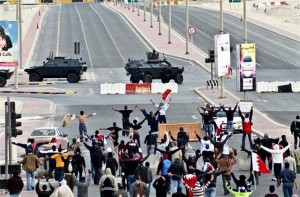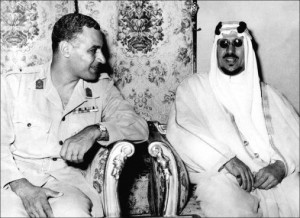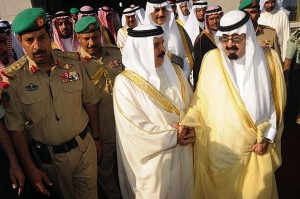Generally speaking, Saudi Arabia opposes any radical political change in any part of the world. Not only did it show hostility to the revolutions in the Arab world, but it also fought revolutions in Latin America (e.g. supporting the Contra rebels). Furthermore, the saudi royal family has continually funded the election campaigns of right wing conservatives in France and Italy, against their socialist rivals.
We already know from history that Saudi Arabia stood against the Egyptian Revolution of 1952, and the coups and revolutions that followed in Iraq and Syria. They were also hostile to the 1962 Yemeni Revolution, and the revolutionary regime in Southern Yemen and the radical political transformations in Libya, Sudan and Iran. Saudi Arabia perceives all forms of change to be dangerous, which must be stopped at all costs.
In the broader context Saudi Arabia has never supported any revolution or liberation movement, even those that were carried out by muslim minorities in the Philippines and Thailand, whose political leaders studied in Medina’s Islamic University in Medina!
One needs to differentiate between supporting a revolution and conspiring against a regime.In the late 1950s King Saud of Saudi Arabia paid huge sums of money in order to get Gamal Abdel Nasser assassinated and hence divide the United Arab Republic. In recent years Saudi Arabia has sought to overthrow the regimes in Qatar and Oman who reject Saudi domination.
The Saudi royal family strives to give its anti-revolutionary policies religious legitimacy. Demonstrations and revolutions are forbidden, haram, whilst obedience to the rulers is obligatory! Their philosophy does not need much explanation: Every Saudi policy takes into consideration the local political situation into account, so that dissent is quietened.
Recently this religious anti-revolutionary principle was violated. The state prohibited demonstrations during the Egyptian and Tunisian revolutions, and threatened to crush the skulls of Saudi demonstrators (Sheikh Borake on Saudi State T.V). Half a million copies of fatwas, which prohibited “evil” demonstrations in the kingdom were handed out.
Today there’s a new classification to revolutions: Halal (permissible) revolutions which are desirable in Syria, Libya, Iraq, Iran, Sudan and Algeria. And Haram (forbidden) revolutions in Yemen, Bahrain, Jordan, Egypt and Tunisia! This clearly shows that the religious justifications that prohibit demonstrations is ill founded and relies on the whims of those in power (i.e. the Saudi princes).
The halal revolutions are useful in removing any regime that the Saudi royal family dislikes or doesn’t serve their interests, as is the case in Syria and Libya. On the other hand, the haram revolutions are detrimental to the rulers of Riyadh and to their Wahhabi doctrine, as is the case with Egypt, Tunisia and Yemen.
There is no religious basis for classifying revolutions as either halal or haram, harmful or beneficial. These classifications are there to serve the interests of the Saudi ruling family.
Sectarian rhetoric was used during the Bahraini revolution in order to justify the Al Khalifa’s tyranny and reduce public sympathy for the revolution. Saudi Arabia’s military intervention succeeded in dividing political opinion in the Arab World.
The Bahraini protesters did not need to use sectarianism to unify their position because they represent the majority of the population. The Bahraini Government wanted to provoke sectarianism in order to lower its political concession, and they have temporarily succeeded with the help of Saudi’s military intervention.
On the other hand Saudi’s sectarian sheikhs and media army killed the embryonic protest movement in Syria by emphasising the sectarian identity of the protest movement. The saudi media gave the impression that the conflict was between the suuni majority on the one hand and a minority Alawi government on the other hand. The aim of this sectarian incitement was to rally the sunnis against the Alawis, but this pathetic sectarian rhetoric scared all the other minorities, including the Christians and Ismailis against the protesters. The Saudi princes were late in realising the damage that their sectarian discourse had on the protest movement, it was too late.
Sectarian language was used widely in the Arabian Peninsula and the source is almost always Saudi Arabia or Qatar. Iraq is a good example. The protests in Iraq were not designed to overthrow the government who was democratically elected, but the Al Jazeera channel placed these protests in the context of the Arab Spring. Al Jazeera lost alot of sympathy, especially when it chose to ignore the situation in Bahrain.
Sectarianism delegitimises revolutions and ultimately leads to their collapse. The Bahraini protests were non-sectarian in nature, but were encircled by sectarianism. In Syria, sectarianism killed the revolution. In Saudi Arabia, the protestors were classified as shiite and belonging to Iran, and those who oppose the protests are proper muslims. Saudi Arabia has sought to play the sectarian card over and over again in Yemen, where the majority of the population belongs to both the Shafi’i and Zaidi sects. Their legendary wisdom has foiled Saudi Arabia’s plans in killing the revolution.
The revolutions in both Egypt and Tunisia were inspired by nationalist sentiment, which succeeded in bridging religious and regional gaps between their citizens. On the other hand, sectarianism is the most important driving factor in the Arabian Peninsula and its people are blinded by it. With it, Saudi Arabia has succeeded in suppressing the revolution in Bahrain by using Al Jazeera and Al Arabiya. Saudi Arabia’s goal is to bring the curtain down on democracy in the Gulf.






















